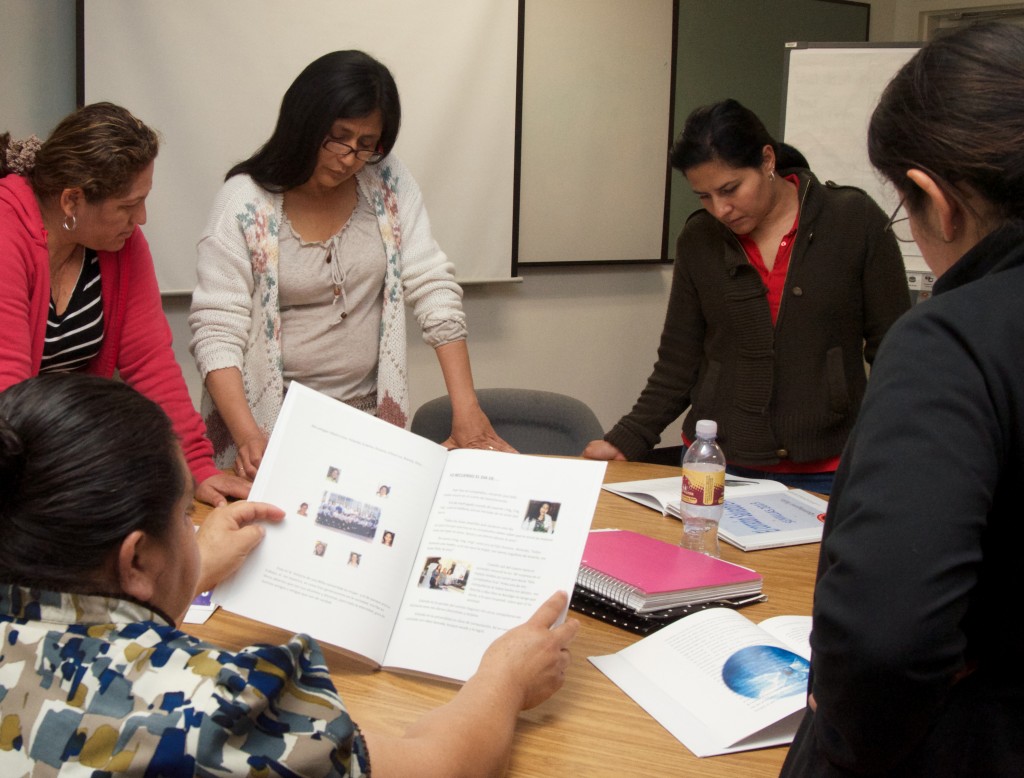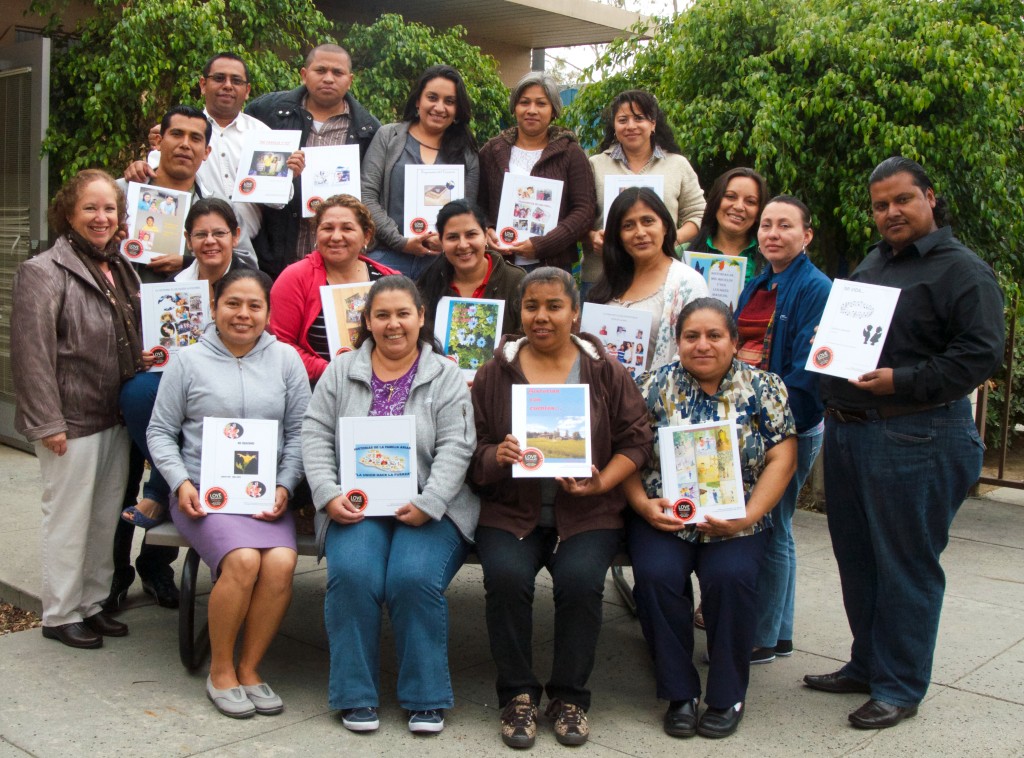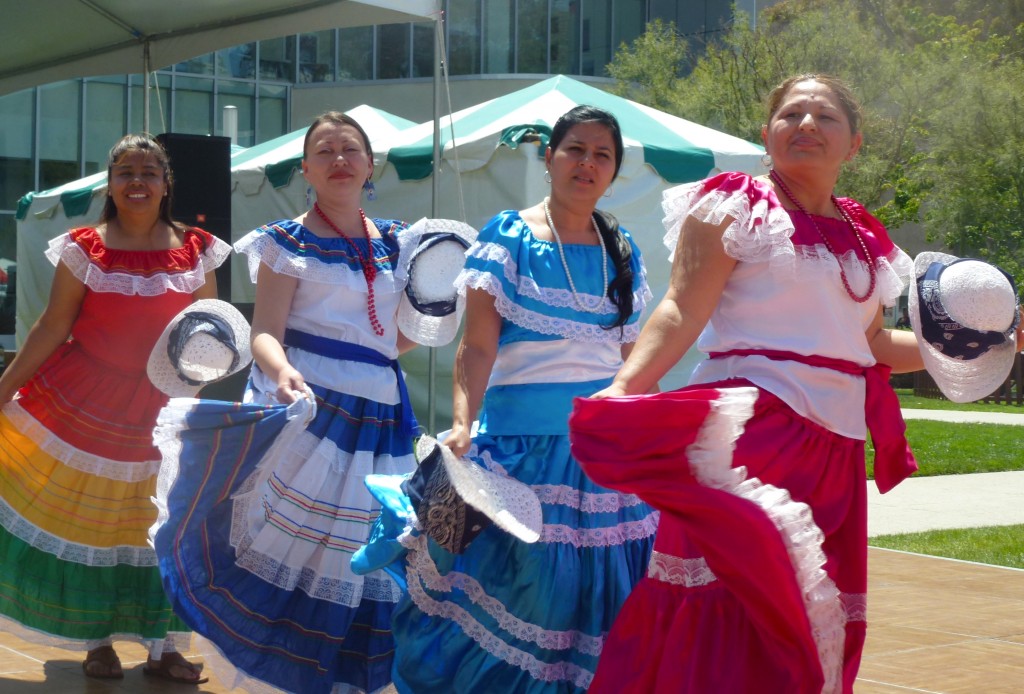Some have lost parents and even entire families to a civil war that lasted 12 years, yet others narrowly escaped getting caught up in the endemic gang life in El Salvador before finding their professional calling, and they have put the details down on paper.

Deep in concentration, some fighting back tears, 17 middle school teachers and administrators from the Central American country read each other’s autobiographical essays that were published in personalized books they can take with them when they complete their six months of study at California State University, Dominguez Hills.
“Some were raised by grandparents when their parents were killed in the revolution in El Salvador. Some are single parents,” said Lilia Sarmiento, associate professor of teacher education, who is the academic advisor and reading and writing instructor for the visiting educators. “This project gives them the opportunity to tell their story.”
The book is just one assignment as part of a larger professional development program that has brought them to the United States to learn, as educators, how to better help their at-risk students. The Strengthening Education for Teachers of At-Risk Youth in El Salvador is a Scholarship for Education and Economic Development (SEED) program funded through the United States Agency for International Development (USAID). Administered by the Center for Intercultural Education and Development at Georgetown University, SEED works with institutions across the United States to bring individuals from economically disadvantaged areas of Central America and the Caribbean to the United States to learn best practices in their field.
This is the second SEED grant for teachers CSU Dominguez Hills has received in recent years. The previous years brought health professionals from Central America and the Dominican Republic to learn the latest about insect-borne diseases and vector control, and educators to learn about primary education in the United States. In fact, the university has served more USAID scholars in the last year than any other master’s serving institution.
The university was awarded this current USAID SEED grant to provide instruction–by Sarmiento as well as teachers and principals from local schools– to two cohorts each of 17 educators from El Salvador. The first cohort has been here since January and will remain through June, and a second cohort will arrive in July and stay through December. Then in 2014 a new USAID SEED grant awarded to CSU Dominguez Hills will welcome 20 educators from four Central America countries and the Dominican Republic for a full year of study.
“Their main focus is prevention of gang violence and to learn strategies and programs that they can take back to El Salvador. Whether in the area of parent involvement or improving their own pedagogy content,” Sarmiento said.

Carlos Portal, a teacher and principal at Centro Escolar de Cantón Las Cruces, a rural school in El Salvador, is here to learn about teaching methodology that will help to keep students interested in school and out of gangs. Through theatre arts activities taught to them by associate professor of teacher education Jill Aguilar, he and the other SEED scholars are learning about the impact of education during early adolescence.
“The SEED scholars quickly saw that these activities were flexible and adaptable into all aspects of the curriculum. One of the math teachers, Juan Pablo, said today that he knew that not all of the activities [were directly applicable to] a math classroom… but he would use them anyway because they could focus and animate his students, ‘preparing the soil for the seeds,’” Aguilar relayed.
The SEED scholars also had the opportunity to see North American education at work through six weeks of observations in classrooms at intermediate and high schools in the Los Angeles, Lennox, and Montebello school districts.
Sarmiento encourages the SEED scholars to develop relationships with those teachers and to maintain ongoing communications after they return to El Salvador with the intent of creating a global exchange between their respective students through video conferencing technology.
As a part of the commitment with the host observation schools, the Salvadorian educators have shared information about their culture. To fulfill 40 required hours of community service, among other things they have performed Salvadorian regional dances at the university’s Unity Fest in April and served as youth activity leaders during Día del Niño held at the cultural plaza in downtown Los Angeles later that month.

In El Salvador’s first year participating as a country in the USAID program, the group has contributed through scholarly presentations at the Jornada Pedagógica Internacional para la Educación Bilingüe held at Loyola Marymount in Los Angeles in March, and the California Association for Bilingual Education annual conference held in Long Beach in February.
The SEED scholars are learning computer programs such as PowerPoint, Excel and Prezi, and–particularly important for those who will be responsible for teaching English upon their return to El Salvador–they receive English language instruction through one-to-one and group sessions. The lessons are tailored to their individual proficiency levels–which range from none to minimal–by their instructors who include volunteer ESL (English as a Second Language) teachers and alumnae R. Jannette Castillo (Class of ’09, B.A., English literature; ’11, M.A., teaching English as a second language) and Angelica Gonzalez (Class of ’11, B.A., liberal studies; ’12, multi-subject teaching credential), who is now pursuing a master’s degree in multi-cultural education at the university.
“[Instructing the SEED scholars] was a little challenging at first, because I teach K-8 and never taught adults, but the students are very open to what they want to learn. Their feedback helps me structure my lessons and helps me become a better teacher for them,” said Gonzalez, who is a substitute teacher in the Los Angeles Unified School District. “Teaching them helps give me more confidence in my teaching.”
Injecting powerful social context to the program, Sarmiento, who has been involved in the program since 2011, has arranged for prominent Los Angeles-based community and business leaders to speak at special sessions, including Alex Sanchez, a former gang member turned founder of the non-profit anti-gang organization Homies Unidos (he participated in three sessions); native Salvadorian Randy Jurado Ertll, who grew up in South Central Los Angeles, and in his book “Hope in Times of Darkness,” delivers a message that minority youth can become productive citizens; and iconic Father Gregory Boyle, the founder of an economic development and jobs program, Homeboy Industries, for high-risk, formerly gang-involved men and women.
“It’s been a very enriching and rewarding experience for everyone involved,” Sarmiento said.